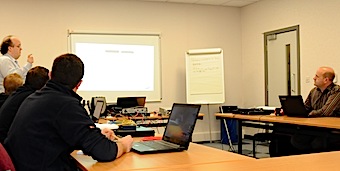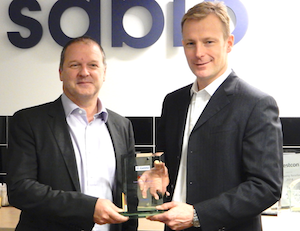A mobile managed service delivered by Ethos Voice & Data to Valk Fleet UK has streamlined the food delivery company's communications operation and delivered significant savings across mobile tariffs, mobile devices and human resources.
Valk Fleet UK provides an outsourced food delivery service and operates a fleet of drivers who work around the clock delivering thousands of orders across the UK to restaurants.
Ethos Voice & Data, (which will produce £1m EBITDA this year and IS part of the Ethos Communications Group), secured the deal to provide a mobile contract and service for 1,200 users with 3,000 more to be rolled out this year.
Tablets will also be deployed across all independent restaurants served by the company.
"With no ability to lock down services on mobile and tablet devices it was difficult to control usage, type of usage and therefore billing control," said Matt Hill, Managing Director of Ethos Voice & Data. "The devices weren't always being used for their business function."
Valk Fleet UK also lacked control over the management of its previous mobile service. With no fixed monthly contract it was difficult to predict costs and to make matters worse tariffs sometimes increased without warning.
"MDM online software enables Ethos, as the partner to Valk Fleet UK, to track employees' mobile usage," added Hill.
"Each user can be bespoke configured when the device is shipped, and we can manage the device and all the applications remotely, therefore ensuring each user's usage is managed efficiently."
All mobiles are integrated into the driver fleet and SIM technology enables the tracking of driver activity and productivity.
In addition to enhanced visibility across its mobile estate Valk Fleet UK now receives a fixed bill, giving the food delivery service complete control of its communications spend.
"It is important for any business to manage costs and quality of service. We have helped Valk Fleet UK with both," added Hill.
"By providing a new three-year managed service mobile contract across all phones, tablets and tracking devices we have reduced the customer's monthly spend, with a projected £1m pounds saving over the term.
"The MDM tools we have provisioned control usage and make it easy for the business to roll out new versions of software to their apps, and also ensure that restaurants can communicate across Wi-Fi or 4G."
Valk Fleet UK CEO Steve Knight added: "We are constantly reviewing our cash management and Ethos has helped us save thousands versus our previous communication contract provider."

 Nimans has put more resellers on the road to doing W-Fi business following Samsung WLAN workshops at its Manchester HQ.
Nimans has put more resellers on the road to doing W-Fi business following Samsung WLAN workshops at its Manchester HQ. Eclipse has launched its third annual Fastest 4 reseller incentive promotion and again features Ex-Stig Ben Collins who 'can't wait to get cracking' with the winners on race day.
Eclipse has launched its third annual Fastest 4 reseller incentive promotion and again features Ex-Stig Ben Collins who 'can't wait to get cracking' with the winners on race day. Sabio has secured Gamma Platinum Partner status following its success in bringing Gamma's portfolio of SIP trunking and inbound number solutions to the contact centre market and broadening its network services portfolio.
Sabio has secured Gamma Platinum Partner status following its success in bringing Gamma's portfolio of SIP trunking and inbound number solutions to the contact centre market and broadening its network services portfolio.